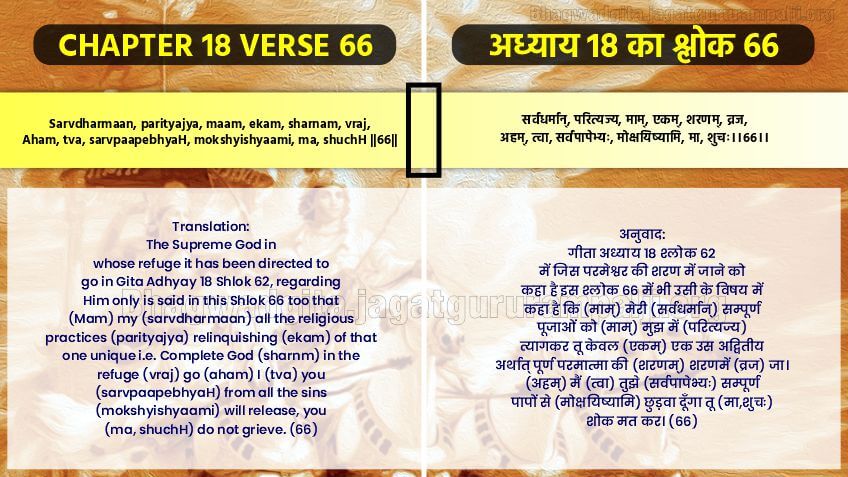
Sarvdharmaan, parityajya, maam, ekam, sharnam, vraj,
Aham, tva, sarvpaapebhyaH, mokshyishyaami, ma, shuchH ||66||
Translation: The Supreme God in whose refuge it has been directed to go in Gita Adhyay 18 Shlok 62, regarding Him only is said in this Shlok 66 too that (Mam) my (sarvdharmaan) all the religious practices (parityajya) relinquishing (ekam) of that one unique i.e. Complete God (sharnm) in the refuge (vraj) go (aham) I (tva) you (sarvpaapebhyaH) from all the sins (mokshyishyaami) will release, you (ma, shuchH) do not grieve. (66)
Translation
Relinquishing all my religious practices in me, you go in the refuge of only that one unique i.e. Complete God. I will release you from all the sins. You do not grieve.
Important
The other translators of Gita have written the meaning of “vraj” as “to come”, which is wrong. The meaning of “vraj” word is ‘to go’, ‘to depart’.
Meaning
The meaning of Shlok 63 is that the giver of the knowledge of Gita, Brahm is saying that Oh Arjun! I have imparted this extremely confidential knowledge of Gita to you. Then in Shlok 64, the narrator of the knowledge of Gita says another most confidential of all the secrets that the Supreme God about whom there is mention in Shlok 62, that Supreme God is my (the speaker of the knowledge of Gita) revered deity i.e. venerated God. This evidence is also mentioned in Adhyay 15 Shlok 4 that I am also in the refuge of that Supreme God. It is evident from this that there is some other Most Superior God than the speaker of the knowledge of Gita. He alone is worthy of being worshipped. This evidence is also in Adhyay 15 Shlok 17. God, the speaker of the knowledge of Gita, states that the Supreme God superior to Kshar Purush (Brahm) and Akshar Purush (ParBrahm) mentioned in Adhyay 15 Shlok 16 is someone other than the above-mentioned two. He only is called Parmatma (God) in reality. He only is actually immortal.
सर्वधर्मान्, परित्यज्य, माम्, एकम्, शरणम्, व्रज,
अहम्, त्वा, सर्वपापेभ्यः, मोक्षयिष्यामि, मा, शुचः।।66।।
अनुवाद: गीता अध्याय 18 श्लोक 62 में जिस परमेश्वर की शरण में जाने को कहा है इस श्लोक 66 में भी उसी के विषय में कहा है कि (माम्) मेरी (सर्वधर्मान्) सम्पूर्ण पूजाओंको (माम्) मुझ में (परित्यज्य) त्यागकर तू केवल (एकम्) एक उस अद्वितीय अर्थात् पूर्ण परमात्मा की (शरणम्) शरणमें (व्रज) जा। (अहम्) मैं (त्वा) तुझे (सर्वपापेभ्यः) सम्पूर्ण पापोंसे (मोक्षयिष्यामि) छुड़वा दूँगा तू (मा,शुचः) शोक मत कर। (66)
विशेष:- अन्य गीता अनुवाद कर्ताओं ने ‘‘व्रज्’’ शब्द का अर्थ आना किया है जो अनुचित है ‘‘व्रज्’’ शब्द का अर्थ जाना, चला जाना आदि होता है।
भावार्थ:- श्लोक 63 का भावार्थ है कि गीता ज्ञान दाता ब्रह्म कह रहा है कि हे अर्जुन! यह गीता वाला अति गोपनीय ज्ञान मैंने तुझे कह दिया। फिर श्लोक 64 में गीता ज्ञानदाता एक और सम्पूर्ण गोपनीयों से भी गोपनीय वचन कहता है कि वह परमेश्वर जिस के विषय में श्लोक 62 में कहा है वह परमेश्वर मेरा (गीता ज्ञान दाता) का ईष्ट देव अर्थात् पूज्य देव है यही प्रमाण अध्याय 15 श्लोक 4 में भी कहा है कि मैं भी उस परमेश्वर की शरण हूँ। इससे सिद्ध है कि गीता ज्ञान दाता प्रभु से कोई अन्य सर्वश्रेष्ठ परमेश्वर है वही पूजा के योग्य है। यही प्रमाण अध्याय 15 श्लोक 17 में भी है गीता ज्ञान दाता प्रभु कहता है कि अध्याय 15 श्लोक 16 में वर्णित क्षर पुरूष (ब्रह्म) तथा अक्षर पुरूष (परब्रह्म) से भी श्रेष्ठ परमेश्वर तो उपरोक्त दोनों से अन्य ही है वही वास्तव में परमात्मा कहलाता है। वह वास्तव में अविनाशी है। उसी की शरण में जाने के लिए कहा है।
